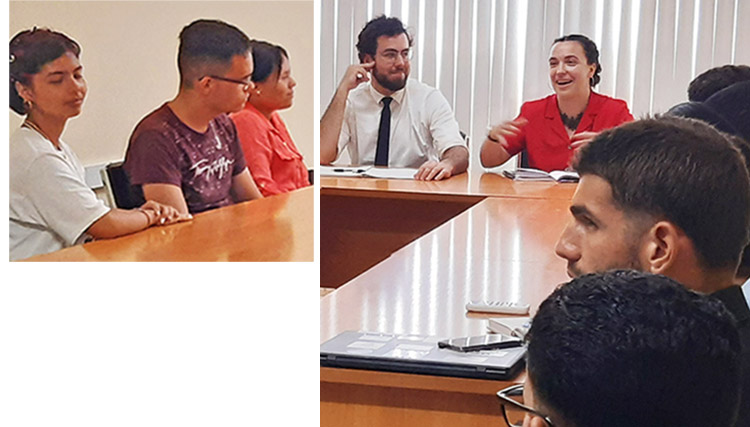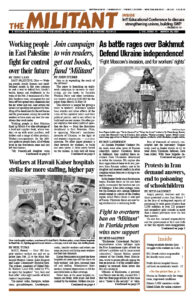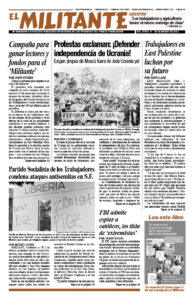HAVANA — Young socialists from the United States, Canada and the United Kingdom were invited by Cuban youth organizations for an exchange with students here Feb. 17. The lively back-and-forth took up an array of topics. The students were particularly interested in learning from their visitors about conditions facing working people and youth in their countries, about their struggles and how communist workers are participating in them.
“It’s important for Cuban youth” to hear firsthand about these experiences, said Mirthia Brossard, international relations director for the Union of Young Communists (UJC), as she welcomed the visitors.
Taking part in the exchange were some 20 students at the Higher Institute on International Relations (ISRI), where the meeting was held. They were joined by leaders of the Federation of University Students (FEU) and the UJC.
Gabrielle Prosser, who is a member of the Socialist Workers Party as well as the Bakery, Confectionery, Tobacco Workers and Grain Millers union, and works in an industrial bakery in Minneapolis, described how over the last couple of years increasing numbers of workers in the U.S. have stood up to say “Enough is enough!” in response to the brutal intensification of labor, unsustainable hours, attacks on job safety and declining real wages.

Félix Vincent Ardea, a member of the Communist League in Canada and the Teamsters union who is a train conductor in Montreal, gave examples of similar changes among working people there.
The Cuban students peppered them with questions. “In the elections in your countries, there are parties on the left and the right, but in the end they are all capitalists. How do you respond to that situation?” asked one of the students.
“In face of the crisis in the world today, none of the capitalist parties offers a solution other than shifting it onto the backs of workers and farmers,” said Prosser. “We point to how workers are beginning to use our collective economic power and class solidarity, and we explain that our class needs to organize independently of all capitalist parties. We need a labor party based on our unions.
“What workers and farmers in Cuba accomplished in taking political power and carrying out a socialist revolution is an example for working people everywhere,” Prosser added. “We explain that as we encourage participation in actions demanding an immediate end to Washington’s economic war on the Cuban Revolution.”
‘Change in working class’
“A change is taking place in the working class, and that’s also true in the United Kingdom,” said Ólöf Andra Proppé, a rail worker and member of the Communist League in that country.
“Hundreds of thousands of workers in the U.K. have taken part in work stoppages and strike actions over wages and working conditions,” said Proppé, who has joined those actions with her co-workers. “We’re starting to learn how to use and strengthen our unions and build solidarity.”
Asked if they face problems “because you are communists,” Ardea, who ran last year as a candidate of the Communist League in Canada’s parliamentary elections, said, “When we introduce ourselves as communists, most working people don’t get hung up on that word. They want to discuss the big issues facing us and what we can do together as workers.”
“Why do socialists like yourselves choose to work in these industries?” asked another student. “Workers in basic industry have the greatest economic weight, as we’ve seen, for example, when rail workers go on strike,” said Proppé. “They can shut down everything and it hits the bosses’ profits.”
Workers in industrial bakeries in the U.S., such as Kellogg’s and Frito-Lay, have waged important strikes in the last two years, “demanding more livable schedules and an end to forced overtime, giving us family time,” added Prosser.
“The U.S. government has not signed international environmental protection agreements,” noted Maday Peña Pérez, international relations director for the FEU. “How do you address the question of environmental rights?”
“The capitalist class exploits both labor and nature, the sources of all wealth. It’s the primary source of destruction of both,” said Prosser. “To begin addressing that threat, workers need to fight for control of production at all levels.”
The students had seen news about the recent train derailment in East Palestine, Ohio. They were interested in the young socialists’ explanation of that disaster as an example of how the capitalist bosses endanger workers and their communities, the angry response by local residents, and discussions among workers on the need to strengthen unions and fight for safe job conditions.
Several students shared their personal experiences in how the Cuban people and their revolutionary government confronted the COVID-19 pandemic, drawing on the working-class solidarity and values that a socialist revolution has made possible. They joined with other volunteers to help clean and disinfect hospitals, went door to door to check in on the health of neighbors in their communities and contributed to the collective effort that led to more than 90% of Cuba’s population being inoculated with highly effective Cuban-developed vaccines.
“All of this was done on a voluntary basis. It’s the only way you could mobilize a great army of the youth, as we did,” one student said.
The discussion continued as students eagerly got books from an array of titles brought by the young communists. These included the newest Pathfinder title, The Low Point of Labor Resistance Is Behind Us, and many issues of the Marxist magazine New International.
Later that afternoon, four of the students made their way to the Pathfinder stand at the Havana International Book Fair to continue discussion up to the last minute when book fair organizers closed down the site for the day. As one of them commented on the way out, “It’s good to know there are workers parties in the United States and other countries whose perspective is to make a socialist revolution.”

